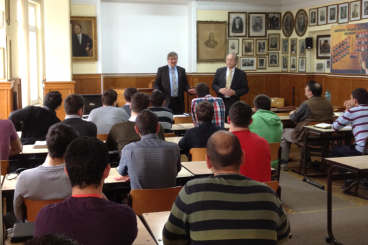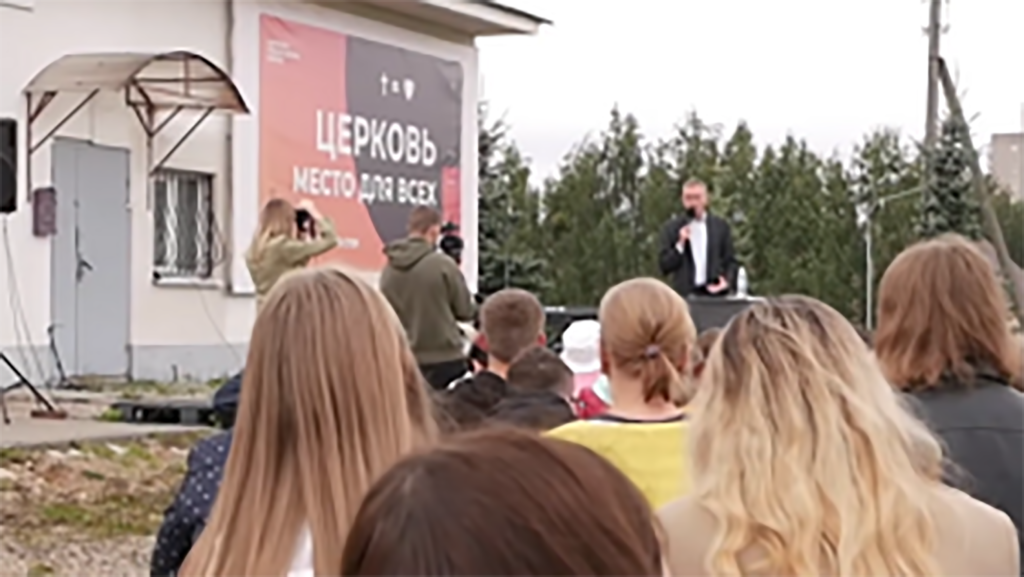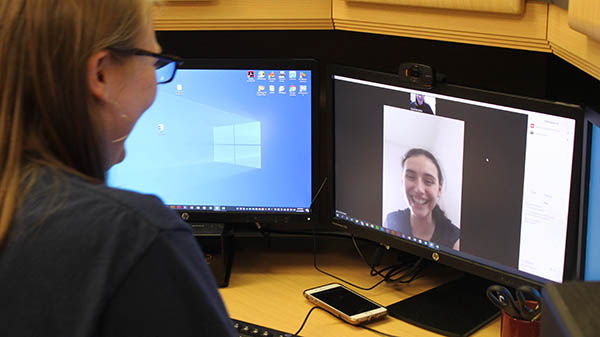For Romania’s Baptist Theological Institute of Bucharest (BTIB), its 93-year history has been turbulent. Begun in the aftermath of the “War to End all Wars” — World War I — when Baptists were first recognized as an official religion by the government, the school had to endure opposition from nationalistic governments, a second world war, confiscation of its property, persecution by communist governments and resistance from a society that considered Baptists a dangerous and heretical sect.
Today despite continuing challenges, BTIB is a respected and fully accredited part of the educational establishment of Romania and, more importantly, the primary source for trained ministers for the nation’s 1,800 Baptist churches.
As graduation nears for the current class, most men already know where they will serve. Should a graduate not be called by the time he finishes, the school will use its network of influence to find the new minister a place to serve.
BTIB’s primary function is to prepare pastors. Young men, most coming out of high school, enroll in a four-year program leading to a bachelor of theology degree. With that in hand, they are eligible to receive a license from the Baptist Union of Romania making them eligible to serve as pastor of a Baptist church in the country. The Romanian government requires church pastors be approved by their respective unions.
The young men study under the BTIB faculty, which also forms the theological faculty of the Baptist College located at the University of Bucharest. The academic credentials of the faculty reveal advanced degrees from top theological schools across the continent as well as Southern Baptist Convention seminaries in the United States.
Faculty members are more than professors. They serve as pastors of churches in Bucharest and beyond, enabling them to help young men make the connection between their classroom work and their call to ministry. For example, BTIB President Daniel Maris serves as pastor of Golgotha Baptist Church, Bucharest. New Testament professor Otniel Bunaciu, who currently serves as president of the Baptist Union of Romania and as president of the European Baptist Federation, serves as pastor of Providence Baptist Church in Bucharest. Bunaciu’s father served as pastor of Providence Baptist before him and they served together for a few years as the role was handed off to Bunaciu. With their years combined, the Bunacius have served Providence for 58 years.
Students follow a similar pattern of mixing academic studies with practical ministries. Each student must spend six weeks working under the supervision of a local pastor. Each Christmas and spring, the young men spend one week working in the churches. In the summer, each spends a month working in a ministry project.
The supervising pastor evaluates the student and BTIB faculty reviews the evaluation with the student to increase the learning experience.
The would-be pastors study the Old and New Testaments, Christian theology, apologetics, missiology, evangelism, leadership and more. When they receive their degree they are ready for pastoral work or to pursue advanced degrees anywhere in Europe or the U.S.
Many of the young men enroll at the Baptist College for master’s work, and some continue on into the doctor of philosophy degree in theology program. Currently more than 40 students are pursuing the master’s degree there.
The Baptist College also provides an educational tract for other evangelicals in Romania including Pentecostals and Brethren students. Again it is the BTIB faculty teaching in the Baptist College, though this time accredited by the University of Bucharest.
In addition to its resident students, BTIB has about 50 students enrolled in online classes. The school is approved for 25 students in each of its four years of residential study and 50 students each year in the online program.
Southern Baptists initially helped underwrite construction and operating costs of BTIB but that stopped long ago. However, Richard Clark, a current Southern Baptist representative in Romania, teaches part-time at the school. Today funds come from Romanian churches, student fees and money raised outside the country.
Students pay the equivalent of about $900 in tuition for a year’s study. Room and board comes to about $300 for the nine-month school term. Maris said the room and board charge covers about 30 percent of the actual cost. But because of the depressed economy in Romania, it is difficult to charge students higher prices.
Churches in Romania, like churches in the U.S., are using a growing percentage of their offerings on local ministries resulting in less money given to the Baptist Union of Romania. In turn, money supporting seminary education is dwindling.
Through its trustees the school is encouraging churches to support the seminary financially. Efforts also are underway to enlist support of the business community. To date officials have rejected funds offered them by the Romanian government like the government support given students in seminaries of Eastern Orthodox and other religious groups. Officials cite concern about church-state relations as the reason for declining the funds.
Maris, who is in his first term as principal of the school, said fundraising and student recruitment are the two largest challenges facing the historic institute.
“God has guided this school through more difficult times than we have now,” Maris said. “God helped us outlast the Communists, and I am confident God will continue to make training for pastors of Romanian Baptist churches pastors available to the young men He calls to ministry.”
For more information, visit www.itb.ro.
To read other articles about Baptist work in Romania, click here, here, here, here, here or here.






Share with others: